情态动词总结及翻译题
情态动词详细用法归纳

情态动词详细用法归纳 Document serial number【KK89K-LLS98YT-SS8CB-SSUT-SST108】情态动词详细用法归纳情态动词有具体的词义,但也同助动词一样,需要与其他词语一起构成句子的谓语,另外情态动词没有人称和数的变化,情态动词后必须跟动词原形。
1. can 的用法:(1)表示能力、许可、可能性。
表示能力时一般译为“能、会”,即有种能力,尤其是生来具备的能力。
如:She can swim fast, but I can’t . 她能游得很快,但我不能。
could是can的过去式。
表示过去的能力。
be able to do sth. 常常指经过努力,花费了时间和劳力之后才能做到某事。
(2)表示许可,常在口语中。
如:You can use my dictionary. 你可以用我的字典。
(3)表示推测,可能性,意为“可能”,常用于否定句和疑问句中,此时can’t 译为“ 不可能”。
如:Can the news be true 这个消息会是真的吗?—Can it be our teacher那个人有可能是我们老师吗?—No, it can’t be our teacher. He is on a visit to the Great Wall.不可能。
咱们老师正在游览长城呢。
【例题】—I think Miss Gao must be in the library. She said she would go there.—No. She be there, I have just been there.A.can’tB.mustn’tC.needn’tD.wouldn’t【解析】根据下文“我刚去过那儿”可知,应为“ 不可能”,can’t 表示推测[答案] A2. could的用法:(1)can的过去式,意为“ 能、会”,表示过去的能力。
如:He could write poems when he was 10. 他十岁时就会写诗。
情态动词解---最好版

• C. could have expressed
• D. must have expressed
• 4.------Hi, Tom. Any idea where Jane is?
•
he-r-----Shtehe_Cr_e_j_u_st_
in the now.
classroom.
I
saw
• A. shall be B. shouldn’t have been C. must be D.
警告、允诺、威胁。
• You shall be punished if you keep on coming to school late.
• He shall be fired . • 3. 根据某项协议规定 “应该” • You shall bring down the price according to the
.
3
• must • 1. “必须” 否定式:mustn’t 不应该、不许可、不准、禁
止 • You must hand in your homework before the class is
over. needn’t /don’t have to “不必” • 2. 肯定式表示对现在或过去的推测,“一定” • must be doing sth./must have done sth. • He must be waiting for us now. • He must have seen the film. • 3. “非得、偏要” (常用于疑问句/条件状语从句中) • Must I play the piano at home, mum? • If you must know, her name is Lucy.
(完整版)情态动词翻译训练

1.那不会是真的!That can’t be true!2.作为人类,任何人都会犯错。
As a human being, anyone can make mistake.3.她有时非常的健忘。
She can be very forgetful sometimes.4.香蕉可以用来酿酒。
The banana can be used for making wine. / The wine canbe made from bananas.5.这条高速公路有时会很拥挤。
This motorway sometimes can get busy.6.月亮不会一直是圆的。
The moon can’t always be at the full.7.晚上有可能会下雨。
It may/might be rainy/rain tonight.8.我晚上可能会去电影院,但是我不确定。
I may/might go to the cinematonight, but I’m not sure.9.这家商店可能没开门。
This shop may/might not be open.10.我下周末可能外出。
I may/might go away next weekend.11.小行星有可能撞击地球。
The asteroid may/might hit the earth.12.我明天或许会打网球。
I may/might play tennis tomorrow.13.Rebecca或许一会儿会回电话。
Rebecca may call back later.14.“你今晚出去吗?” “或许吧”。
“Are you going out tonight?” “I might.”15.买张彩票吧!你或许运气不错!Buy a lottery ticket! You might be lucky!。
人教版英语英语情态动词专项及解析含答案百度文库
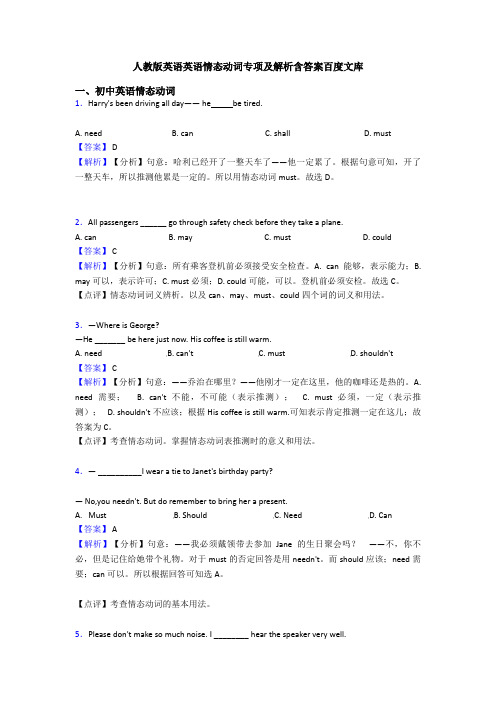
人教版英语英语情态动词专项及解析含答案百度文库一、初中英语情态动词1.Harry's been driving all day—— he be tired.A. needB. canC. shallD. must【答案】 D【解析】【分析】句意:哈利已经开了一整天车了——他一定累了。
根据句意可知,开了一整天车,所以推测他累是一定的。
所以用情态动词must。
故选D。
2.All passengers ______ go through safety check before they take a plane.A. canB. mayC. mustD. could【答案】 C【解析】【分析】句意:所有乘客登机前必须接受安全检查。
A. can能够,表示能力;B. may可以,表示许可;C. must必须;D. could可能,可以。
登机前必须安检。
故选C。
【点评】情态动词词义辨析。
以及can、may、must、could四个词的词义和用法。
3.—Where is George?—He _______ be here just now. His coffee is still warm.A. needB. can'tC. mustD. shouldn't【答案】 C【解析】【分析】句意:——乔治在哪里?——他刚才一定在这里,他的咖啡还是热的。
A. need需要; B. can't 不能,不可能(表示推测); C. must 必须,一定(表示推测); D. shouldn't不应该;根据His coffee is still warm.可知表示肯定推测一定在这儿;故答案为C。
【点评】考查情态动词。
掌握情态动词表推测时的意义和用法。
4.— __________I wear a tie to Janet's birthday party?— No,you needn't. But do remember to bring her a present.A. MustB. ShouldC. NeedD. Can【答案】 A【解析】【分析】句意:——我必须戴领带去参加Jane的生日聚会吗?——不,你不必,但是记住给她带个礼物。
情态动词详细用法归纳
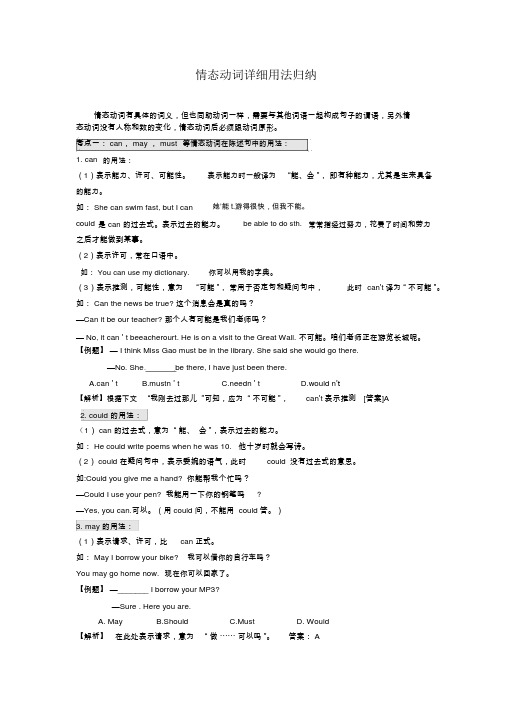
情态动词详细用法归纳情态动词有具体的词义,但也同助动词一样,需要与其他词语一起构成句子的谓语,另外情态动词没有人称和数的变化,情态动词后必须跟动词原形。
考点一: can, may , must等情态动词在陈述句中的用法:1. can的用法:(1)表示能力、许可、可能性。
表示能力时一般译为“能、会”,即有种能力,尤其是生来具备的能力。
如: She can swim fast, but I can她’能t.游得很快,但我不能。
could是 can 的过去式。
表示过去的能力。
be able to do sth.常常指经过努力,花费了时间和劳力之后才能做到某事。
(2)表示许可,常在口语中。
如: You can use my dictionary.你可以用我的字典。
(3)表示推测,可能性,意为“可能”,常用于否定句和疑问句中,此时can’t译为“不可能”。
如: Can the news be true? 这个消息会是真的吗?—Can it be our teacher? 那个人有可能是我们老师吗?— No, it can ’ t beeacherourt. He is on a visit to the Great Wall. 不可能。
咱们老师正在游览长城呢。
【例题】— I think Miss Gao must be in the library. She said she would go there.—No. She be there, I have just been there.A.can ’ tB.mustn ’ tC.needn ’ tD.would n’t【解析】根据下文“我刚去过那儿”可知,应为“ 不可能”,can’t表示推测[答案]A2.could 的用法:(1) can 的过去式,意为“能、会”,表示过去的能力。
如: He could write poems when he was 10. 他十岁时就会写诗。
情态动词(讲义及答案)

情态动词(讲义)一、can, could, may, might 表示请求许可1.区别Can I take the book awayCould I take the book awayMay I take the book awayMight I take the book away语气的委婉程度从高到低为 can, could, may, might。
2.can, could, may, might 表示请求许可时的回答。
—Can you give me another chance—Yes, I can. No, I can’t.—Could I look at your pictures—Yes, of course you ./—I am sorry you .#用c ould 提问,表示“能……吗”,若表示同意用 can,不同意用c an ’t,注意不用 could 来回答。
—May I speak to you for a moment in private, pleaseMay 表示请求许可时,常常与第一人称 I 连用,构成“May I…”句式,表示“我可以……吗”肯定回答用 Yes, you may. / Yes, please. / Yes, of course.否定回答用N o, you can’t. / No, you mustn’t. ( )—May I smoke here—, you . It can be dangerous.A.Yes; canB. No; can’tC. Yes; mayD. No; needn’tMight I come inMight I borrow some moneymight 用于礼貌的询问是否能做某事,常出现在口语中,用法稍显过时。
肯定回答通常用 may,否定回答可以用 can’t 或者 mustn’t。
练习:~( )—Can I get you a drink—. I am not thirsty.A.That’s very nice of youB. No, you don’t have toC. Yes, pleaseD. With pleasure ( )—May I leave the classroom now 1—No, you . You shouldn’t le ave until the bell rings.A. may notB. can’tC. needn’tD. couldn’t( )—you pass me a pen I’d like to write down the telephone number.A. NeedB. CouldC. MustD. Should ( )—Could I use your eraser for a while—Yes, of course you .A. couldB. willC. canD. should二、情态动词和短语情态动词1.情态动词needThe little girl needs to get some sleep.I needed two more days to finish thework. Do you need to have some coffeeneed 作实义动词,有人称,时态的变化。
【英语】高考英语情态动词题20套(带答案)及解析
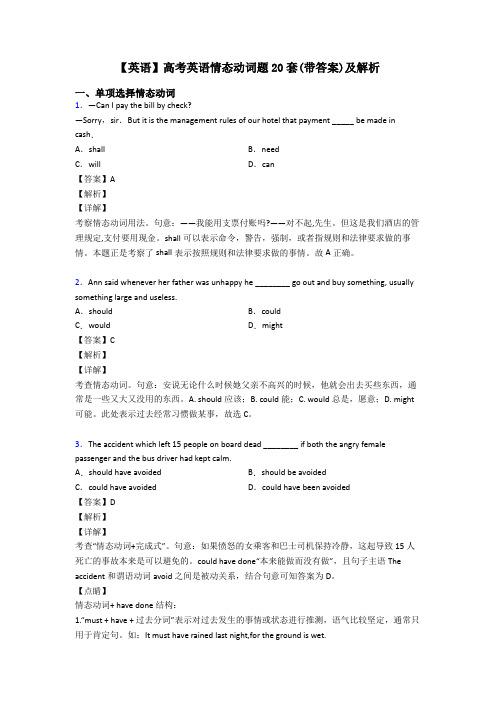
【英语】高考英语情态动词题20套(带答案)及解析一、单项选择情态动词1.—Can I pay the bill by check?—Sorry,sir.But it is the management rules of our hotel that payment _____ be made in cash.A.shall B.needC.will D.can【答案】A【解析】【详解】考察情态动词用法。
句意:——我能用支票付账吗?——对不起,先生。
但这是我们酒店的管理规定,支付要用现金。
shall可以表示命令,警告,强制,或者指规则和法律要求做的事情。
本题正是考察了shall表示按照规则和法律要求做的事情。
故A正确。
2.Ann said whenever her father was unhappy he ________ go out and buy something, usually something large and useless.A.should B.couldC.would D.might【答案】C【解析】【详解】考查情态动词。
句意:安说无论什么时候她父亲不高兴的时候,他就会出去买些东西,通常是一些又大又没用的东西。
A. should应该;B. could能;C. would总是,愿意;D. might 可能。
此处表示过去经常习惯做某事,故选C。
3.The accident which left 15 people on board dead ________ if both the angry female passenger and the bus driver had kept calm.A.should have avoided B.should be avoidedC.could have avoided D.could have been avoided【答案】D【解析】【详解】考查“情态动词+完成式”。
大学英语情态动词完整详细版附练习题

大学英语情态动词完整详细版附练习题情态动词概述情态动词是英语中一类特殊的动词,用于表达说话人的意愿、能力、推测、建议、许可等。
常见的情态动词有 "can"、"could"、"may"、"might"、"shall"、"should"、"will"、"would"、"must" 等。
以下是对每个情态动词的详细解释和用法:1. Can 表示能力、许可或请求。
例如:Can表示能力、许可或请求。
例如:- I can swim.(我会游泳。
)- Can I use your pen?(我可以用你的钢笔吗?)2. Could 过去式形式的 "can",表示能力、请求或礼貌的请求。
例如:Could过去式形式的"can",表示能力、请求或礼貌的请求。
例如:- I could ride a bike when I was five.(我五岁时就会骑自行车了。
)- Could you please open the window?(可以请你打开窗户吗?)3. May 表示许可或推测。
例如:May表示许可或推测。
例如:- May I go to the bathroom?(我可以去洗手间吗?)- It may rain tomorrow.(明天可能会下雨。
)4. Might 过去式形式的"may",表示推测或可能性较小。
例如:Might过去式形式的 "may",表示推测或可能性较小。
例如:- I thought it might be too late.(我想可能太晚了。
)5. Shall 表示将来时态的意愿、建议或命令。
例如:Shall表示将来时态的意愿、建议或命令。
初中英语情态动词详细用法归纳(含练习及答案)
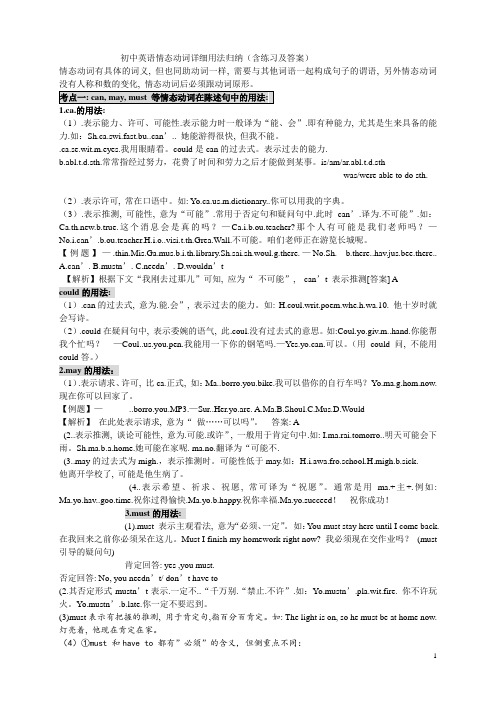
初中英语情态动词详细用法归纳(含练习及答案)情态动词有具体的词义, 但也同助动词一样, 需要与其他词语一起构成句子的谓语, 另外情态动词没有人称和数的变化, 情态动词后必须跟动词原形。
1.ca.的用法:(1).表示能力、许可、可能性.表示能力时一般译为“能、会”.即有种能力, 尤其是生来具备的能力.如:Sh.ca.swi.fast.bu..can’.. 她能游得很快, 但我不能。
.ca.se.wit.m.eyes.我用眼睛看。
could是can的过去式。
表示过去的能力.b.abl.t.d.sth.常常指经过努力,花费了时间和劳力之后才能做到某事。
is/am/ar.abl.t.d.sthwas/were able to do sth.(2).表示许可, 常在口语中。
如: .m.dictionary..你可以用我的字典。
(3).表示推测, 可能性, 意为“可能”.常用于否定句和疑问句中.此时can’.译为.不可能”.如:Ca.th.new.b.true.这个消息会是真的吗?—Ca.i.b.ou.teacher?那个人有可能是我们老师吗?—No.i.can’.b.ou.teacher.H.i.o..visi.t.th.Grea.Wall.不可能。
咱们老师正在游览长城呢。
【例题】—.thin.Mis.Ga.mus.b.i.th.library.Sh.sai.sh.woul.g.there.—No.Sh.__b.there..hav.jus.bee.there..A.can’.B.mustn’.C.needn’.D.wouldn’t【解析】根据下文“我刚去过那儿”可知, 应为“不可能”, can’t 表示推测[答案] Acould的用法:(1).can的过去式, 意为.能.会”, 表示过去的能力。
如: H.coul.writ.poem.whe.h.wa.10. 他十岁时就会写诗。
(2).could在疑问句中, 表示委婉的语气, 此.coul.没有过去式的意思。
情态动词讲解及练习(有答案)

情态动词讲解及练习一、can和could特别说明:(1)could用来表示请求时,语气委婉,主要用于疑问句,不能用于肯定句,答语应用can(即:could不能用于现在时态的简略答语中)。
如:——Could I use your dictionary?——Yes, you can.(否定回答可用:No, I’m afraid not.)(2)can和be able to辨析can(could)和be able to都可以表示能力,意思上没有区别。
但can只有现在式和过去式,而be able to则有更多的形式。
如:I’ve always wanted to able to speak fluent English.Those bags look really heavy, are you sure you’ll be able to carry them on your own?但是,表示在过去某时的某一场合经过一番努力,终于做成了某事,通常不用could,而用was/were able to来表示。
这时,was/were able to相当于managed to do或succeed in doing。
如:After the accident it was a long time before she was able to walk again.The fire was very big, but most people were able to escape from the building.(3) 惯用形式“cannot …too…”表示“无论怎么……也不(过分)”。
如:You cannot be too careful.你越小心越好。
惯用形式“cannot but+ 不定式(不带to)”表示“不得不,只好”。
如:I cannot but admire her determination.我不得不钦佩你的决心。
高考英语情态动词讲解及习题(附答案)
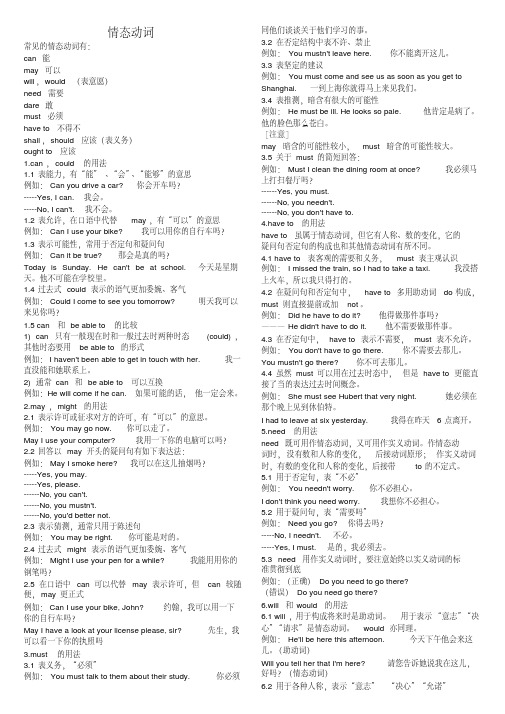
情态动词常见的情态动词有:can 能may 可以will,would (表意愿)need 需要dare 敢must 必须have to 不得不shall,should 应该(表义务)ought to 应该1.can,could 的用法1.1表能力,有“能”、“会”、“能够”的意思例如:Can you drive a car? 你会开车吗?-----Yes, I can. 我会。
-----No, I can't. 我不会。
1.2表允许,在口语中代替may,有“可以”的意思例如:Can I use your bike?我可以用你的自行车吗?1.3表示可能性,常用于否定句和疑问句例如:Can it be true?那会是真的吗?Today is Sunday. He can't be at school.今天是星期天。
他不可能在学校里。
1.4过去式could表示的语气更加委婉、客气例如:Could I come to see you tomorrow?明天我可以来见你吗?1.5 can 和be able to 的比较1) can 只有一般现在时和一般过去时两种时态(could),其他时态要用be able to的形式例如:I haven't been able to get in touch with her.我一直没能和她联系上。
2) 通常can 和be able to 可以互换例如:He will come if he can.如果可能的话,他一定会来。
2.may,might的用法2.1表示许可或征求对方的许可,有“可以”的意思。
例如:You may go now.你可以走了。
May I use your computer?我用一下你的电脑可以吗?2.2回答以may开头的疑问句有如下表达法:例如:May I smoke here? 我可以在这儿抽烟吗?-----Yes, you may.-----Yes, please.------No, you can't.------No, you mustn't.------No, you'd better not.2.3表示猜测,通常只用于陈述句例如:You may be right.你可能是对的。
中考英语常用语法知识——情态动词知识点总结(含解析)
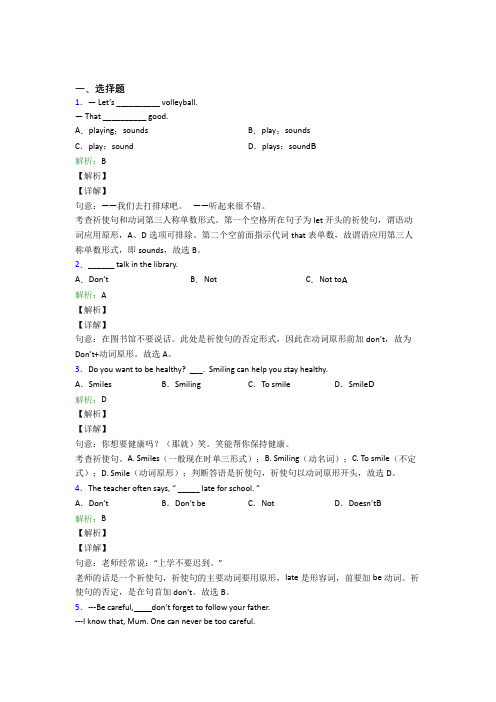
一、选择题1.—Let’s __________ volleyball.— That __________ good.A.playing;sounds B.play;soundsC.play;sound D.plays;sound B解析:B【解析】【详解】句意:——我们去打排球吧。
——听起来很不错。
考查祈使句和动词第三人称单数形式。
第一个空格所在句子为let开头的祈使句,谓语动词应用原形,A、D选项可排除。
第二个空前面指示代词that表单数,故谓语应用第三人称单数形式,即sounds,故选B。
2.______ talk in the library.A.Don’t B.Not C.Not to A解析:A【解析】【详解】句意:在图书馆不要说话。
此处是祈使句的否定形式,因此在动词原形前加don’t,故为Don’t+动词原形。
故选A。
3.Do you want to be healthy? ___. Smiling can help you stay healthy.A.Smiles B.Smiling C.To smile D.Smile D解析:D【解析】【详解】句意:你想要健康吗?(那就)笑。
笑能帮你保持健康。
考查祈使句。
A. Smiles(一般现在时单三形式);B. Smiling(动名词);C. To smile(不定式);D. Smile(动词原形);判断答语是祈使句,祈使句以动词原形开头,故选D。
4.The teacher often says, “ _____ late for school. ”A.Don’t B.Don’t be C.Not D.Doesn’t B解析:B【解析】【详解】句意:老师经常说:“上学不要迟到。
”老师的话是一个祈使句,祈使句的主要动词要用原形,late是形容词,前要加be动词。
祈使句的否定,是在句首加don’t。
故选B。
5.---Be careful, don’t forget to follow your father.---I know that, Mum. One can never be too careful.A.and B.or C.but D.so A解析:A【解析】试题分析:and和,并且;or或者,否则;but但是;so因此。
情态动词总结及翻译题图文稿

情态动词总结及翻译题集团文件版本号:(M928-T898-M248-WU2669-I2896-1.c a n能(力)+可能+允许2.be able to do 经过一番努力做成某事(=manage to do sth)3.may 也许 + 允许 + 句首祝愿4.might 也许(可能性比may小)5.may/might as well do sth不妨做某事6.can’t 不能 + 不可能7.must 必须(主观)——mustn’t 禁止肯定(猜测)——can’t 不可能偏偏,非要 Must you shout so loudlyMust you smoke here 猜测 must do 肯定be doing 肯定正在做have done sth肯定已经做8.mustn’t 禁止9.don’t have to 不必= needn’t do / don’tneed to do10.shall 语气(允诺,命令,警告,决心)征求意见 Shall he come to see you?要不要让他来见你11. should1.应该2(义务+在情理之中的可能)2.虚拟语气3.竟然4.在lest , for fear that , in case , 等引起的从句中,其谓语用should +动词原形。
He cleans the glass with care for fear that he should break it .5.should带感情色彩,常用在why , how 开头的疑问句中。
Why should I invite himHow should I know .11. will 意愿 I will do it .倾向 Fish will die out of water.难免,毕竟 Accident will happen .事故难免会发生。
Boys will be boys.男孩毕竟是男孩。
(完整)初一情态动词讲解及练习附答案
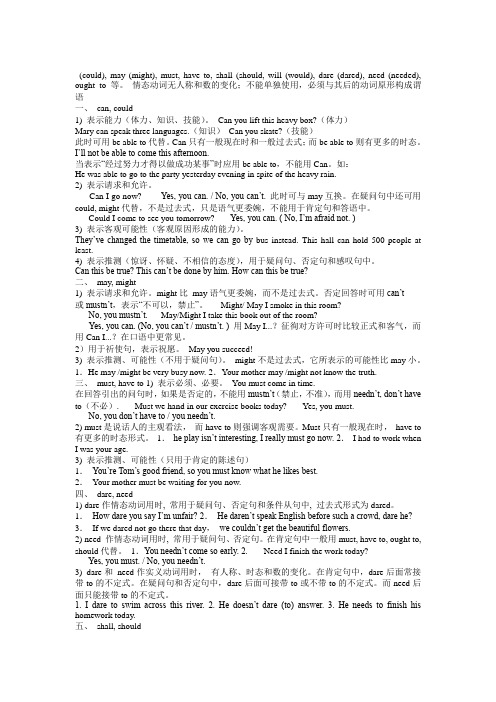
(could), may (might), must, have to, shall (should, will (would), dare (dared), need (needed), ought to等。
情态动词无人称和数的变化;不能单独使用,必须与其后的动词原形构成谓语一、can, could1) 表示能力(体力、知识、技能)。
Can you lift this heavy box?(体力)Mary can speak three languages.(知识)Can you skate?(技能)此时可用be able to代替。
Can只有一般现在时和一般过去式;而be able to则有更多的时态。
I’ll not be able to come this afternoon.当表示“经过努力才得以做成功某事”时应用be able to,不能用Can。
如:He was able to go to the party yesterday evening in spite of the heavy rain.2) 表示请求和允许。
-----Can I go now? ----- Yes, you can. / No, you can’t. 此时可与may互换。
在疑问句中还可用could, might代替,不是过去式,只是语气更委婉,不能用于肯定句和答语中。
---- Could I come to see you tomorrow? ---- Yes, you can. ( No, I’m afraid not. )3) 表示客观可能性(客观原因形成的能力)。
They’ve changed the timetable, so we can go by bus instead. This hall can hold 500 people at least.4) 表示推测(惊讶、怀疑、不相信的态度),用于疑问句、否定句和感叹句中。
英语情态动词题20套(带答案)及解析
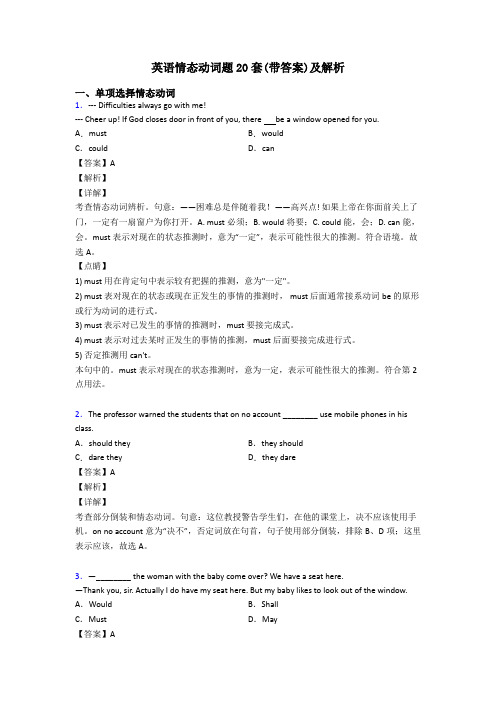
A.shallB.must
C.canD.should
【答案】D
【解析】
【详解】
考查情态动词。句意:我仍然难以想象这样聪明的孩子竟然犯这样愚蠢的错误。should作为情态动词,可以用来表示意外、惊喜或者在说话人看来是不可思议的,常常译为"竟会"、"居然",这么聪明的孩子竟然犯这样愚蠢的错误。表示意外,shall表示允诺,命令等,must表示必须,can表示能力及可能性。所以答案选D。
【答案】B
【解析】
试题分析:考查情态动词用法。Shouldn’t have done本不应该做某事,实际上却做了(虚拟语气);couldn’t have done不可能做某事(对过去情况的推测);needn’t have done本不需要做某事,实际上却做了(虚拟语气);句意:我的姐姐昨天下午在街上遇见了他,所以他不可能去听了你的演讲。故B正确。
3. shall用于第一、第三人称疑问句中,表示说话人征求对方的意见或向对方请示。如:Shall we begin our lesson? When shall he be able to leave the hospital?
4. shall用于第二、第三人称,表示说话人给对方命令、警告、允诺或威胁。如:You shall fail if you don't work harder.(警告)He shall have the book when I finish reading.(允诺)He shall be punished.(威胁)
英语情态动词讲解及练习(附答案)

英语情态动词讲解及练习(附答案)情态动词讲解定义:情态动词表示说话人对动作的态度,比如:需要,可能,意愿,猜测或者怀疑等等。
情态动词本身有一定意思,但不完全,不能单独作谓语,必须与动词原形连用。
否定句中,在情态动词后面加not。
情态动词有:must, shall, should, had better 词形无变化can(could), may(might), will(would) 词形有变化need既可以是情态动词,也可以是实义动词,具有双重性。
一、can 表示“能,会”,否定为:can’t = can not = cannot 其过去式为:could→couldn’t(1)表示会做某事,有能力做某事。
意思= be able toe.g. He can speak English, but he can’t speak Japanese.= He is able to speak English, but he isn’t able to speak Japanese.I could smile but I couldn’t speak w hen I was 2 months old.= I was able to smile but I wans’t able to speak when I was 2 months old.区别:① can只用于现在时和过去时(could), be able to 可用于各种时态。
e.g. They will be able to tell you the news soon.Mingming has been able to count numbers.② be able to 不与can连用,但可以和其他情态动词或助动词连用。
e.g. He may be able to speak English very well some day in the future.He may can speak…………………………………………………..He can be able to speak……………………………………………..(2)用于征求意见——Can /Could /May /Might I(we) do sth?——Yes, you can/may. / Of course you can.——No(Sorry), you can’t. /mustn’t.注意:①此处的could和might都不表示过去,只是语气上的委婉,不用作回答。
英语情态动词总结和练习含答案解析百度文库

英语情态动词总结和练习含答案解析百度文库一、初中英语情态动词1.——You look pretty in green, Kate. ——Thank you. I like green. Green ______give me energy.A. canB. mustC. shouldD. has to【答案】A【解析】【分析】句意:一一凯特,你穿看绿色的衣服很漂亮。
一一谢谢,我喜欢绿色。
绿色给我能量。
A.能,表示能力;B.must必须,强调主观愿望;C.应该,强调责任与义务;D.必须.强调客观要求。
绿色能给我力量,我喜欢。
故选A。
2.—Where is Monica? I can't find her anywhere.—She be in the library. She loves reading books when she is free.A. mustB. needC. can't【答案】 A【解析】【分析】句意:——莫妮卡在哪?我到处都找不到她。
——她肯定在图书馆,她喜欢空闲时看书。
A肯定,肯定句中表示推测,B需要,C不可能,否定句中表示推测,根据 She loves reading books when she is free ,可知是肯定句表示推测,故选A。
【点评】考查情态动词,注意情态动词表推测的用法。
3.According to the law, traffic keep to the left in England.A. mayB. mustC. needD. can【答案】 B【解析】【分析】句意:根据法律规定,在英国车辆必须靠左形式。
A.may可以,表示允许;B.must必须,表示要求;C.need需要,表示必要性;D.can能,表示能力。
根据According to the law,可知法律的要求,应是必须的,应用must,故答案为B。
【点评】考查情态动词。
九年级上英语常用语法知识——情态动词(含答案解析)
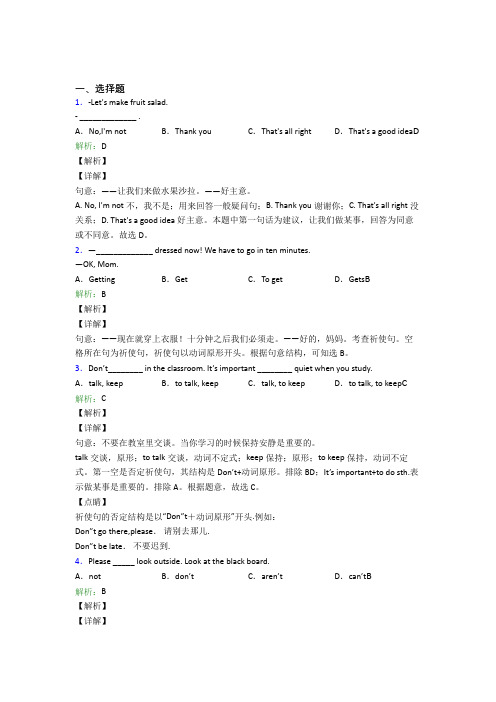
一、选择题1.-Let's make fruit salad.- _____________ .A.No,I'm not B.Thank you C.That's all right D.That's a good idea D 解析:D【解析】【详解】句意:——让我们来做水果沙拉。
——好主意。
A. No, I'm not不,我不是;用来回答一般疑问句;B. Thank you谢谢你;C. That's all right没关系;D. That's a good idea好主意。
本题中第一句话为建议,让我们做某事,回答为同意或不同意。
故选D。
2.—_____________ dressed now! We have to go in ten minutes.—OK, Mom.A.Getting B.Get C.To get D.Gets B解析:B【解析】【详解】句意:——现在就穿上衣服!十分钟之后我们必须走。
——好的,妈妈。
考查祈使句。
空格所在句为祈使句,祈使句以动词原形开头。
根据句意结构,可知选B。
3.Don’t________ in the classroom. It’s important ________ quiet when you study. A.talk, keep B.to talk, keep C.talk, to keep D.to talk, to keep C解析:C【解析】【详解】句意:不要在教室里交谈。
当你学习的时候保持安静是重要的。
talk交谈,原形;to talk交谈,动词不定式;keep保持;原形;to keep保持,动词不定式。
第一空是否定祈使句,其结构是Don’t+动词原形。
排除BD;It’s important+to do sth.表示做某事是重要的。
排除A。
根据题意,故选C。
【点睛】祈使句的否定结构是以“Don”t+动词原形”开头.例如:Don”t go there,please.请别去那儿.Don”t be late.不要迟到.4.Please _____ look outside. Look at the black board.A.not B.don’t C.aren’t D.can’t B解析:B【解析】【详解】句意:请不要往外面看,看黑板。
- 1、下载文档前请自行甄别文档内容的完整性,平台不提供额外的编辑、内容补充、找答案等附加服务。
- 2、"仅部分预览"的文档,不可在线预览部分如存在完整性等问题,可反馈申请退款(可完整预览的文档不适用该条件!)。
- 3、如文档侵犯您的权益,请联系客服反馈,我们会尽快为您处理(人工客服工作时间:9:00-18:30)。
1.can 能(力)+ 可能+ 允许
2.be able to do 经过一番努力做成某事(=manage to do
sth)
3.may 也许+ 允许+ 句首祝愿
4.might 也许(可能性比may小)
5.may/might as well do sth不妨做某事
6.can’t 不能+ 不可能
7.must 必须(主观)——mustn’t 禁止
肯定(猜测)——can’t 不可能
偏偏,非要Must you shout so loudly
Must you smoke here
猜测must do 肯定
be doing 肯定正在做
have done sth肯定已经做
8.mustn’t 禁止
9.don’t have to 不必= needn’t do / don’t need to do
10.shall 语气(允诺,命令,警告,决心)
征求意见Shall he come to see you要不要让他来见你
11.should
1.应该2(义务+在情理之中的可能)
2.虚拟语气
3.竟然
4.在lest , for fear that , in case , 等引起的从句中,其谓语用should +动词原形。
He cleans the glass with care for fear that he should break it .
带感情色彩,常用在why , how 开头的疑问句中。
Why should I invite him
How should I know .
11.will 意愿I will do it .
倾向Fish will die out of water.
难免,毕竟Accident will happen .事故难免会发生。
Boys will be boys.男孩毕竟是男孩。
12.would 当时,奶奶老是(would)坐在那里看报纸13.need /dare 否定句和疑问句用法
你不必去那里(want)
( can)
需要他去那里么(want)
(can)
14.need doing sth/ need to be done 需要被做某事(花朵需要浇水)
15.dare
它既可以作形为动词又可以作情态动词,作情态动词时,主要用于疑问句,否定句及条件句中,陈述句中很少使用但(I dare say )除外。
没人称和数的变化,但有时态变化,过去时为dared. 否定式为daren’t .
16.He ought to be punished ,_oughtn’t he__________ 17. could have done sth 可能做过某事
本可能做某事,而实际没有/本能够做某事,而实际没有
18.needn‘t have done sth本没必要做某事,而实际做了
19. would like to have done sth本打算做某事,而实际没有
20.情态动词的回答方式
问句肯定回答否定回答
Need you…Yes, I must.No,I needn't
Must you…Yes,you must. Needn’t/don't have to. 21.情态动词表推测
肯定的推测一般用must, should, may(might)或could(不用can),其中,must的语气最强,译为“肯定”、“准是”、“想必是”;should的语气次之,译为“很可能”、“应该”,指按常理推测;may(might),could的语气最弱,译为“也许”、“可能”。
否定推测分为两种情况:
1)语气不很肯定时,常用may not, might not
或could not,译为“可能不”、“也许不”。
2)否定语气较强时,则用can’t,译为“根本不可能”、“想必不会”,表示惊异、怀疑的感情色彩。
翻译练习
1.有10人从着火的房子里逃了出来
2.我真希望我能飞啊
3.我能进来么
4.你不能在这里吸烟。
5.他会是谁呢can
6.他不可能正在等你。
7.他不可能已独自去那里了。
8.他可能来,但我认为他不会来。
9.愿上帝保佑你!_
10. 如果那样的话,你不妨试一下 3 / 6
11. 父母不在家,他必须得照顾他的弟弟
12.你本不必把事情告诉他
13.你不可以把事情告诉他
14.你非要抽烟的话,去外面抽。
15.你现在肯定累了,是么
16.你现在肯定在学习,是么
17. 我肯定在睡觉,所以没接你的电话。
18.他现在肯定不在家
19.在你生日时,你可以得到一份礼物。
20.要不要让他来见你
21.真遗憾他竟然这么粗心
22.我怎么会知道呢
23.男孩毕竟是男孩
24.奶奶过去老坐在那看报纸。
25.你不需要去(2)
26. 他需要去那里么是的/不必
27.当时他不敢当众说英语
28.你敢去那儿么敢/ 不敢
29. 昨晚肯定下过雨了,是么
30.你本不该去那儿的。
31. 他可能已经做完作业了。
32. The phone is ringing, _______________(但是没人接听。
她一定不在家).
2) I can’t find my sunglasses. _______________(我可能昨天落在咖啡店里了).
4) It’s a pity. _______________(你本应该邀请她来参加你的毕业典礼的).
5) _______________(其实我没必要穿上我最好的套装去参加那次聚会的); most of the guests were wearing jeans and sweaters.
1昨晚那间屋子着火了,但那家人都逃了出来
2我不会告诉老师这件事
3办公室不能抽烟
4灯还亮着,他肯定还在学习
5你又迟到了,你应该早点起床
7我本来没有必要买这么多食物,只来了5个人
10本来他可以通过考试。
但是他太粗心了,
11.有必要马上派他到那里去。
usgoatonce lest weshouldbelateforthetrain.
我们马上走吧,以免赶不上火车。
13. 他只有4岁,但已认得字了。
14.这消息可能是真的吗?
15.这不可能是校长,他去美国了。
31. 他可能已经做完作业了。
might have finished
32. The phone is ringing, _but nobody answers, she can’t be at home (但是没人接听。
她一定不在家).
2) I can’t find my sunglasses. I must have left it at the shop (我可能昨天落在咖啡店里了).
4) It’s a pity. _you should have invited her (你本应该邀请她的).
5) __needn’t have done_ (其实我没必要穿上我最好的套装去参加那次聚会的); most of the guests were wearing jeans and sweaters.
1昨晚那间屋子着火了,但那家人都逃了出来
be able to
2我不会告诉老师这件事
will not
3办公室不能抽烟
mustn’t
4灯还亮着,他肯定还在学习
must be studying
5你又迟到了,你应该早点起床
should have done
7我本来没有必要买这么多食物,只来了5个人needn’t have done
10本来他可以通过考试。
但是他太粗心了,
could have done
11.有必要马上派他到那里去。
it is necessary that sb (should) do
us go at once lest we should be late for the train.我们马上走吧,以免赶不上火车。
13.他只有4岁,但已认得字了。
can
14.这消息可能是真的吗
can the news be true
15.这不可能是校长,他去美国了。
it can’t be the headmaster。
